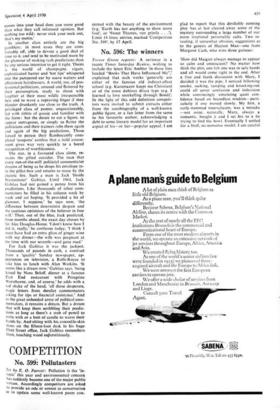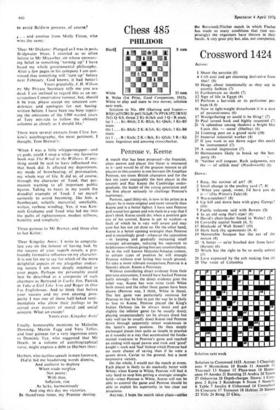COMPETITION
No. 5991 Polluta.sters
Set by E. 0. Parrott: Pollution is the 'in- topic' this year and environmental• concern has suddenly become one of the major public virtues. Accordingly competitors are asked to provide an ode or sonnet to conservation or to update some well-knowd poem con-
cerned with the beauty of the environment (e.g. 'Earth has not anything to show more foul', or 'Sweet Thames, run grimly . . .'). Limit 14 lines; entries, marked 'Competition No. 599', by 17 April.
No. 596: The winners
Trevor Grove reports: A reviewer in a recent Times Saturday Review, wishing to include the latest Eric Ambler 'in those lists headed "Books That Have Influenced Me"; explained that such works 'generally are either of the famous old indirect-effect school (e.g. Karamazov keeps me Christian) or of the more dubious direct type (e.g. I learned to love snorkelling through Bond)'. In the light of this odd definition competi- tors were invited to submit extracts either from the autobiography of a well-known public figure, or a fan letter from the same to his favourite author, acknowledging a debt to some literary model for an important aspect of his—or her—popular appeal. I am glad to report that this devilishly cunning ploy has at last cleared away some of the mystery surrounding a large number of our more irrational personality cults. Two re- vealing, if somewhat obvious, suggestions as to the genesis of Huyton Man—one from Margaret Cash, who wins three guineas: 'How did Maigret always manage to appear so calm and omniscient? No matter how thick the plot, one felt one was in safe hands and all would come right in the end. After a free and frank discussion with Mary. I decided it was the pipe. I noticed billowing smoke, sucking, tamping and knocking-out could all cover confusion and indecision while convincingly simulating quiet con- fidence based on boundless wisdom—parti- cularly if one moved slowly. My first, a curly-stemmed meerschaum, was a mistake —not mine, naturally. Mary, always a romantic, bought it and 1 set fire to a tie trying to find the bowl. Eventually I settled for a bluff, no-nonsense model. I am careful to avoid Baldwin gestures, of course' . and another from Molly Fitton, who wins the same:
`Dear Mr Dickens: Plunged as I was in post. Bridgwater blues, I resorted as so often before to Mr Micawber, on whose unswerv- ing belief in something "turning up" I have based my whole governmental philosophy. After a few pages in his company I am con- vinced that something will "turn up" before next February. God knows, it had better-1i Yours gratefully, 1. H. Wilson Ps My Private Secretary tells me you are dead. I am inclined to regard this as an un- scrupulous Conservative rumour, but, should it be true, please accept my sincerest con, dolences and apologies for not having written before. I have been too busy repair- ing the omissions of the 1300 wasted years of Tory mis-rule to follow the obituary columns as closely as I should like.'
There were several extracts from Clive Jen- kins's autobiography, the most pertinent, I thought, Tom Brewer's:
`When I was a little whippersnapper—and ye gods, could I snap a whip—my favourite book was The Wind in the Willows. If any- thing could be said to have influenced me, that book did. It affected my deportment, my mode of browbeating, of provocation, my whole way of life. It did so, of course, through the character of Toad, that per- manent warning to all important public figures. Taking to heart in my youth the dreadful example of Toad. I set myself earnestly to avoid becoming, like him, a flamboyant, volatile, mercurial, unreliable, witless, verbose windbag. Yes, it was Ken- neth Grahame and Toad who led me into the paths of righteousness, modest stillness, humility and simplicity.'
Three guineas to Mr Brewer, and three also to Ian Kelso:
'Dear Kingsley Amis: I write to congratu- late you on the honour of having had, by the success of your superb novels, a pro- foundly formative influence on my character. It is not for me to say for which of the more delightful aspects of my altogether endear- ing nature I am most deeply indebted to your pages. Perhaps my personality could best be described as a composite of such charmers as Bertrand in Lucky Jim, Patrick in Take a Girl Like You and Roger in One Fat Englishman. And to think that before your success and my own ensuing pros- perity I was one of those half-baked senti- mentalists who allow their feelings to be stirred over matters of moral and social concern. What an escape!
Yours ever, Kingsley Ands'
Finally, honourable mentions to Malcolm Downing, Martin Fagg and Vera Telfer, and four guineas for a very ingenious entry to Dominic Tye, who suggested that Mr Heath, in a volume of autobiographical verse, might express a debt to Herbert thus: Herbert, who tactless speech in men forswore, Did'st bid me headstrong words dismiss. And outburst to deplore When trade surplice Not poore: With thee, Inflation, rise As larks, harmoniously And sing this day my victories, In thund'rous tones, my Premier destiny.



































 Previous page
Previous page